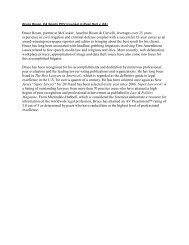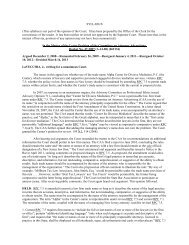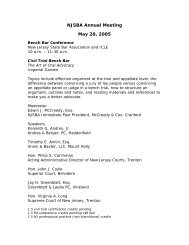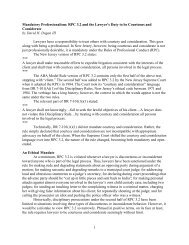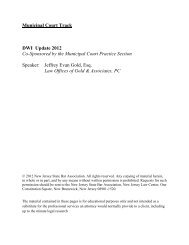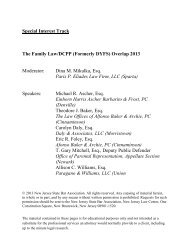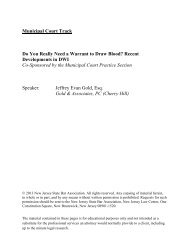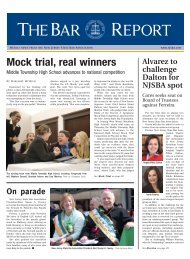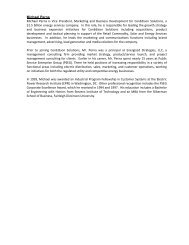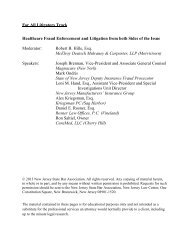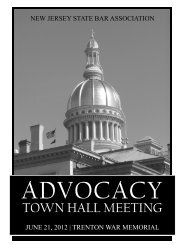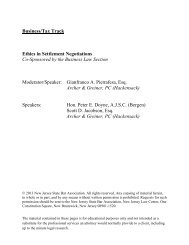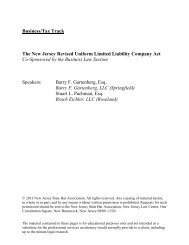State v. Henderson and the New Model Jury Charges - New Jersey ...
State v. Henderson and the New Model Jury Charges - New Jersey ...
State v. Henderson and the New Model Jury Charges - New Jersey ...
You also want an ePaper? Increase the reach of your titles
YUMPU automatically turns print PDFs into web optimized ePapers that Google loves.
a-8-08.opn.html<br />
focus on system variables.<br />
Fourth, we are mindful of <strong>the</strong> practical impact of today’s ruling. Because<br />
defendants will now be free to explore a broader range of estimator variables at<br />
pretrial hearings to assess <strong>the</strong> reliability of an identification, those hearings will<br />
become more intricate. They will routinely involve testimony from both <strong>the</strong><br />
police <strong>and</strong> eyewitnesses, <strong>and</strong> that testimony will likely exp<strong>and</strong> as more<br />
substantive areas are explored. Also, trial courts will retain discretion to allow<br />
expert testimony at pretrial hearings.<br />
In 2009, trial courts in <strong>New</strong> <strong>Jersey</strong> conducted roughly 200 Wade hearings,<br />
according to <strong>the</strong> Administrative Office of <strong>the</strong> Courts. If estimator variables<br />
alone could trigger a hearing, that number might increase to nearly all cases in<br />
which eyewitness identification evidence plays a part. We have to measure that<br />
outcome in light of <strong>the</strong> following reality that <strong>the</strong> Special Master observed:<br />
judges rarely suppress eyewitness evidence at pretrial hearings. Therefore, to<br />
allow hearings in <strong>the</strong> majority of identification cases might overwhelm <strong>the</strong><br />
system with little resulting benefit.<br />
We do not suggest that it is acceptable to sacrifice a defendant’s right to a fair<br />
trial for <strong>the</strong> sake of saving court resources, but when <strong>the</strong> likely outcome of a<br />
hearing is a more focused set of jury charges about estimator variables, not<br />
suppression, we question <strong>the</strong> need for hearings initiated only by estimator<br />
variables.<br />
Appellate review does remain as a backstop to correct errors that may not be<br />
caught at or before trial, <strong>and</strong> <strong>the</strong> enhanced framework may provide a greater<br />
role in that regard in certain cases. If a reviewing court determines that<br />
identification evidence should not have been admitted in accordance with <strong>the</strong><br />
above st<strong>and</strong>ards, it can reverse a conviction.<br />
We also note that trial courts should make factual findings at pretrial<br />
hearings about relevant system <strong>and</strong> estimator variables to lay <strong>the</strong> groundwork<br />
for proper jury charges <strong>and</strong> to facilitate meaningful appellate review.<br />
Finally, we do not adopt <strong>the</strong> analogy between trace evidence <strong>and</strong> eyewitness<br />
identifications. To be sure, like traces of DNA or drops of blood, memories are<br />
part of our being. By necessity, though, <strong>the</strong> criminal justice system collects <strong>and</strong><br />
http://njlaw.rutgers.edu/collections/courts/supreme/a-8-08.opn.html[4/15/2013 6:04:23 PM]



